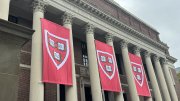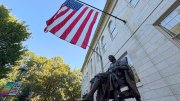President Donald Trump declared late Wednesday evening that he would stop Harvard’s international students from entering the country. The proclamation comes less than a week after U.S. District Judge Allison Burroughs blocked the Trump administration’s attempt to prevent the University from enrolling international students. Last Friday, the U.S. State Department announced expanded screening procedures for visa applicants seeking to come to Harvard for any reason.
The new order blocks incoming international students and exchange visitors from entering the U.S. to begin studies or research at Harvard. It also subjects current international students to additional scrutiny, instructing the State Department to evaluate and potentially revoke existing visas on an individual basis. It is unclear whether current students with valid visas will be allowed to re-enter the country if they leave. The suspension will last six months, with the potential for extension.
On Thursday evening, Harvard filed an amended complaint in its existing lawsuit over government attempts to prevent international students from attending the University, calling Trump’s proclamation “part of a concerted and escalating campaign of retaliation by the government” and “a patent effort to do an end-run around this Court’s order.” Harvard also filed an emergency motion asking for a temporary restraining order to halt enforcement of the proclamation. Later that night, Judge Burroughs issued a temporary restraining order preventing the government from “implementing, instituting, maintaining, enforcing, or giving force or effect” to Trump’s proclamation.
In that proclamation, Trump wrote, “I have determined that the entry of the class of foreign nationals described above is detrimental to the interests of the United States because, in my judgment, Harvard’s conduct has rendered it an unsuitable destination for foreign students and researchers.”
Harvard’s complaint disputed the Trump administration’s legal basis for the travel ban. According to U.S. law, the president has the authority to protect the country from “any class of aliens” whose entry would be “detrimental to the interests of the United States.” But Trump “is not suspending entry for any ‘class of aliens,’” the complaint pointed out. “To the contrary, nonimmigrants may enter the country unabated, as long as they do not attend Harvard.”
Calling Trump’s actions an unlawful “vendetta,” the complaint also referenced a Politico report, published last Friday, that the White House had convened a meeting of officials from nearly a dozen agencies to “brainstorm additional punitive measures” against Harvard.
In a letter emailed to the University community on Thursday evening, Harvard President Alan M. Garber wrote that contingency plans are being developed “to ensure that international students and scholars can continue to pursue their work at Harvard this summer and through the coming academic year” and added that University leaders would give updates about those plans. He said that the Harvard International Office, which provides information and guidance for international students, would be in touch directly with affected students and scholars.
For some students, Trump’s announcement came as a surprise. On May 22, the Department of Homeland Security had announced it was revoking Harvard’s Student and Exchange Visitor Program (SEVP) certification, effectively stripping the University of its ability to enroll international students. Then, last week, DHS seemed to reverse course, giving Harvard 30 days to demonstrate compliance with SEVP requirements before the revocation would take effect.
“My impression was that there was going to be some period of calm, at least for 30 days,” said an international graduate student, who requested anonymity out of fear that speaking to the press could lead to additional scrutiny of his visa. “That’s why today’s news was surprising.”
While Trump’s proclamation nominally exempts current international students, the student fears that the directive for the Secretary of State to review existing visas opens the door for broader revocations. “I do think that will be the next thing they’re going for—trying to revoke everyone’s visas,” he said.
The administration had previously signaled it might pursue alternative legal avenues to prevent international students from attending Harvard. At last week’s hearing about the injunction blocking DHS’s action, Justice Department attorney Tiberius Davis argued that such an injunction could violate the government’s rights. In response, Judge Burroughs asked whether the government was considering other methods to bar international students. The Trump administration’s latest move suggests the answer was yes.
Foreign nationals make up about 27 percent of Harvard’s student body overall, the majority of them graduate students. International students make up 56 percent of Harvard Kennedy School enrollment and 37 percent of the enrollment at the Griffin Graduate School of Arts and Sciences. At Harvard College, about 15 percent of students are international. According to University data, the top five home countries for Harvard’s international students are China, Canada, India, South Korea, and the U.K.
Harvard’s international enrollment numbers are similar to those at research universities across the country—in 2013, a Forbes analysis found that half to two-thirds of graduate students on American campuses were foreign-born, and the proportion of international electrical engineering graduate students across the U.S. was an astonishing 70 percent. In the U.S. labor force, 19 percent of STEM workers are foreign-born, according to a 2024 report from the National Science Foundation; for STEM workers with a Ph.D., the number is 43 percent.
Alfred Williamson ’28, an international student from the U.K., is currently overseas for a summer study-abroad program and is uncertain whether he will be allowed to re-enter the U.S. at the start of next semester. Fearing visa revocations, many international students have refrained from speaking to the press. But the latest news only strengthened his resolve, he said.
“I think the fact that the international community is too scared to speak says something very scary and concerning about the state of American democracy," he said. “This is a country that was founded on the principle of free speech, and yet I've been told by everyone around me that using my voice will present a great risk to myself.”
For Williamson, the rapid back-and-forth between Harvard and the Trump administration—and the resulting uncertainty—has been the hardest part of the last month. “As soon as we feel that we have some hope, that we have a chance, it gets taken away from us once again,” he said.
“We've been caught in the crossfire between Harvard and the White House, and we're being used like pawns in a game we have no control over,” he continued. “We have to sit here and wait as the White House tries to take away our rights, and tries to determine the trajectory of our lives, and we have no say in this at all.”









